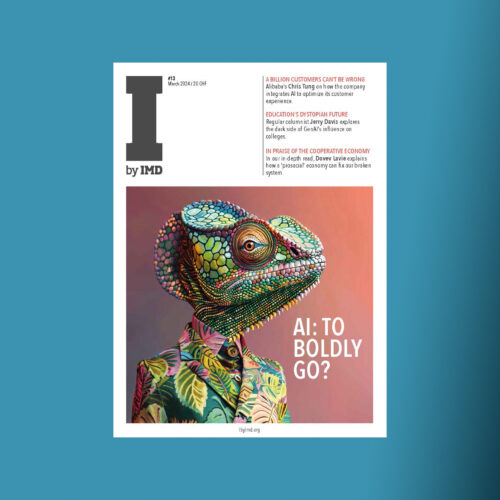If we zoom into marketing, I call it “double E” – engagement and experience. GenAI is going to increase the chances of building innovation in these two areas. We built this capability to help merchants create a digital avatar for short videos, for example – content marketing is very important for online marketing. A digital figure can speak nicely to introduce your product very easily. And the good news is we’ve learned that films with digital avatars increased the click-through rate by 30%. It’s not only less costly but also – we’re providing better engagement with GenAl.
However, AI is not 100% the answer for marketing innovation. AI’s capability for content creation is like having 1,000 content creators instead of one at the same cost. In the past, when we made films with professional filmmakers, we had a predefined target audience. So, when we place the films, each one should hit the target in a strategic way, and there’s a waste in missing the target. With 1,000 films, there’s a risk you are pushing all the films to the wrong targets. You could end up making the film with less money, but you’re wasting your media dollars.
Data intelligence: that’s the answer. Data intelligence includes data capability and AI. On one hand, with the data capability, you’ll be able to collect the data, clear the data, tag the data, understand the profile of your customers, and map the data with the real person to reach them. So, you use AI to analyze what exactly they need, and based on the need, you use AI to create a lot of content for them. So, it’s more like two components of one engine. One is data capability and the other is the AI or GenAI component. They have to work hand in hand to close the loop.
What challenges do you face in applying AI?
We’re a data company – so from a culture standpoint, it’s not such an issue. The challenge that we’re facing is more on the merchant side. There’s so much for our merchants to learn. Our challenge, instead of bringing internal people along, is more like bringing our customers along. We want to build products and tools on a platform level to make it simple to use, easy to understand, and easy to see the results and the early success so they get motivated to do more.
For example, Haleon is a world-leading consumer health and nutrition company. With our help, they recently launched an AI-enabled platform called Intelligent AI Nutritionist. It handles all kinds of nutrition or health-related inquiries to tap into Haleon’s knowledge base to come back with the right guidance for consumers. By working with Haleon’s expertise, we translate that expertise into a service. They don’t have to worry about having that AI capability to digest the expertise, and we don’t have to worry about compiling such an authoritative knowledge base for health and nutrition: it’s a win-win collaboration.
We’re not just servicing world-leading conglomerates. We pay huge attention to small and medium enterprises. AI is helping us level the playing field. We are helping a lot of China’s SMEs export their products all over the world. To go into, for example, Southeast Asia, they need to make a lot of adaptations on how to showcase their products. This is where AI comes into play. We build this product for them so they can localize the content of the product for different markets automatically, upload the essential materials, and cherry-pick the markets. That’s a very useful tool that fixes the fundamental problems they face daily.
What three takeaways do you have for marketing executives?
First, it’s important to embrace change. Still, in the marketing world, I’m seeing people sticking to old models of, for example, creative production. GenAI is going to revolutionize content production for us. It is super powerful and super practical.
Secondly, all marketers have to continue to learn and practice. Yes, it’s heavy lifting, even for players like us in the industry. We have to learn every day, not just to catch up on what’s new or possible with new technology but also to put that thought into practice. I talked about the combination of data capability and GenAI capability. That circle needs to be “practiced”. You’ll learn a lot once you accomplish a project or two. We just have to do it more and you learn.
Lastly and most importantly, we have to adopt AI for innovation, not just for operations. I’m hearing some business leaders adopting AI only for productivity’s sake. That is not enough for marketers. We have to think about how to use AI to come up with new product ideas and service experiences. Can we satisfy our customers in a different way?
YouTube





 Podcast available
Podcast available